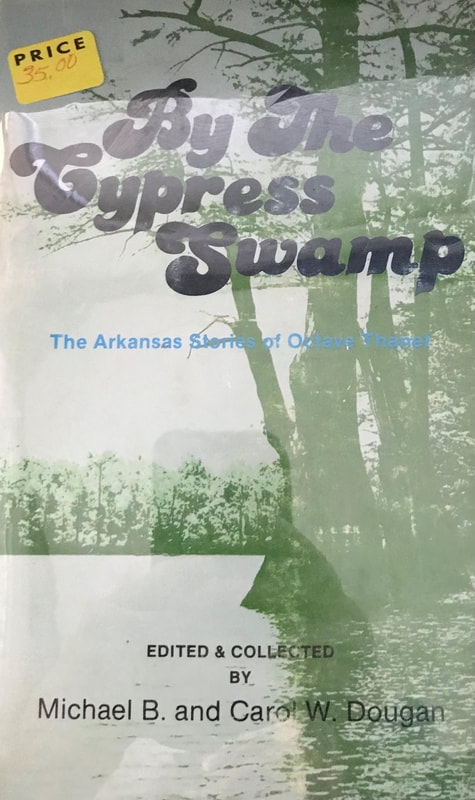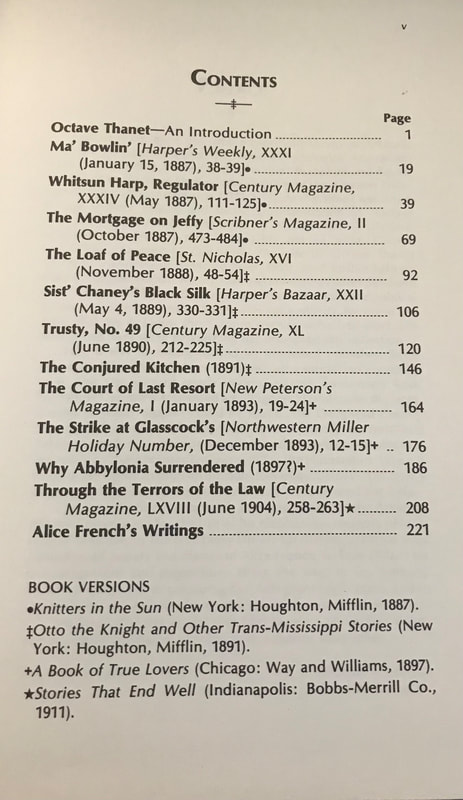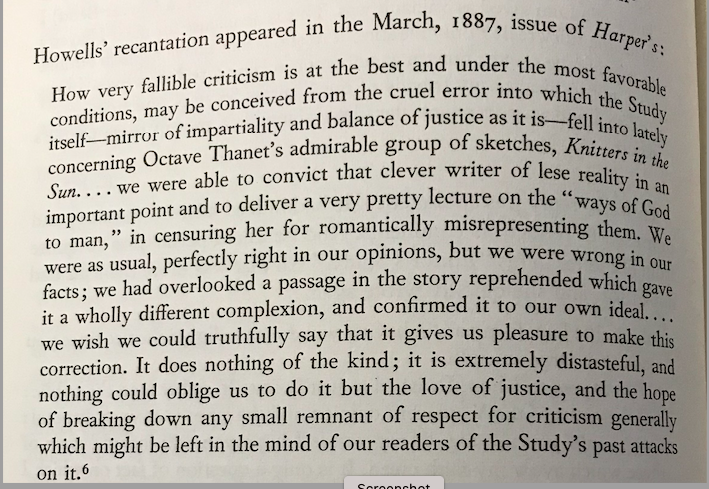|
I was excited to begin Otto the Knight and Other Trans Mississippi Stories in part because of the regional focus. A few of these stories carry over characters from stories published in Knitters in the Sun. Michael B. and Carol W. Dougan's 1980 collection By the Cypress Swamp: The Arkansas Stories of Octave Thanet brings many of those stories together, although the title story "Otto the Knight" is not in that collection. Given the very light emphasis on the setting here, the omission of the story isn't completely surprising. McMichael also only mentions the story itself on page 125, indicating that it was chosen as the title for the collection solely based on the fact it was the first story. The omission is interesting, given that Lum Shinault definitely lives on the Black River in "Whitsun Harp, Regulator" and because there is the connection to getting lost in the swamp. Marty Ann searching for Boo gets lost, just as Ma' Bowlin got lost in the earlier story. Basic Summary:
0 Comments
Basic Plot Summary: Part I: Polly Ann Shinault, wife of Lum, is out fixing the Clover Bend ferry-boat when she sees Whitsun Harp in the boat with her neighbor Boas. Harp has come by because he's heard Lum and Polly are missing a mule, and Polly acknowledges that, saying that Lum is off looking for it, but they assume it has been stolen. He proceeds to tell her his story of becoming a regulator, and how it seems like a calling from God. It's pretty clear Harp was sweet on Polly but Lum beat him to her. Harp mentions that as kids they played together and he told her everything then, which is why he felt the need to personally tell her why he had become a regulator.When he leaves, Boas tells Polly that Harp already warned Lum to shape up and to stop partying. He emphasizes the importance of Lum doing so by telling her different stories of Harp "giving a lickin'" to various people. Lum comes home for supper and when Polly tells him Harp finds him "trifflin'" Lum indicates Harp had better mind his own business. We learn that Lum helps his wife with household chores, having helped his mother because his father was 'triflin.'" We also learn that "he had married Polly Ann out of compassion" (Thanet, p. 316) when her father died. He reasoned that "Nary un waiti' on 'er neether, 'less hit ar' Whitsun Harp. Ef he don' marry her, I reckon Ihed orter. 'Tain't no mo'n neighborly.' //Whitsun making no sign, he carried out his intention" (Thanet, p. 316). In a conversation with Boas, Lum reveals the truth about his interactions with Savannah Lady. They are merely trying to make the man she loves jealous, and Lum thinks there's no harm in it. The trick works, and Morrow proposes to Savannah. Unfortunately, Lum, Whitsun, Polly, and Savannah all converge in the dry bottoms of the swamp and Harp mistakes Lum helping Savannah by giving her whiskey when she is ill to be some romantic tryst. He breaks of a switch and beats Lum. Polly sees it all and chides Lum for not standing up for himself, but she assures him she'll cook him a good dinner. Lum is ashamed and cries because he thinks Polly doesn't love him, and he's sure this was the final straw. Part II: Lum doesn't come home for dinner, despite Polly waiting. She finds a note that indicates he won't be back (Thanet, p. 328). He has taken the gun and plans to kill Whitsun Harp. "He had been beaten before his wife, his wife who valued strength and bravery beyond everything. And Whitsun, whom she praised because he was so strong and brave had beaten him" (Thanet, p. 328). He knows this is a high priority for Polly as her father, Old Man Gooden, shot a man for spitting in his face. According to Polly, "Paw hed ter shoot him" (Thanet, p. 329). Lum assumes Polly pines after Harp, and he decides that if Harp kills him, Polly won't take up with him. On the other hand, if he kills Harp, Polly will never forgive him, either. So, his plan is to "go off on the cotton-boat afore sundown. All through this wide worl' I'll wander, my lone" (Thanet, p.329). Lum (short for Columbus) crosses paths with Boas,who is dying. Boas tells Lum he's come out to warn Harp that some other men are coming to kill him. Boas killed another man a few years back, and ever since he's been haunted by it. He fears going to hell, and he hopes that by warning Harp, God will give him mercy. Unfortunately, he's too weak to go all the way across the swamp and he begs Lum to do it for him. Lum does, but he tells Harp that as soon as Boas dies, he will kill Harp. Harp, upon hearing the truth about Savannah, swears he'll make it up to Lum and Polly, but Lum says there's no way he can. It takes three weeks for Boas to die and Lum acts weird, taking to the woods mostly. Polly worries about him and follows him, but she's not sure what to do and just fears he's gone mad. When Boas dies, Lum joins Harp at the grave and tells him he's still going to kill him and where to meet after the funeral. Harp asks Lum to meet him at the plantation store first, and he does. Harp makes things right by admitting to being wrong and apologizes. He and Lum shake hands, and Lum decides to go squirrel hunting. Meanwhile, Polly notices Lum's boat is gone and she follows him to Clover Bend (using Boas' boat). She hears a single shot and runs towards it, finding Harp dead on the ground, a smile on his face. Lum is nearby, but he tells her the story of how Harp made things right and that it wasn't he who shot him. He tells Polly he'll leave her to her goodbyes, and she realizes he thinks she loves Harp. It turns out she never loved anyone but Lum, and the story ends with them embracing, Harp's dead, smiling body still on the ground. Perhaps you will excuse my mentioning that Whitsun Harp is almost entirely a true story. Harp lived and died as I have tried to picture and Boas was haunted as I have described and (although not in Clover Bend) I know of a Lum saved as Shinault was. This is no excuse for me if I haven't made the story real; I only mention it to show that I have no such notions as you impute to me; but am as uncompromising a realist as lives. I have tried not to idealize my friends of the Cypress Swamp, one atom . . . |
About this project:I've been saying since 2004 that I was going to write a critical biography of Octave Thanet (Alice French). This blog is the start of that work and will include notes, links to research, and other OT related tidbits. Archives
February 2023
Categories
All
|



 RSS Feed
RSS Feed